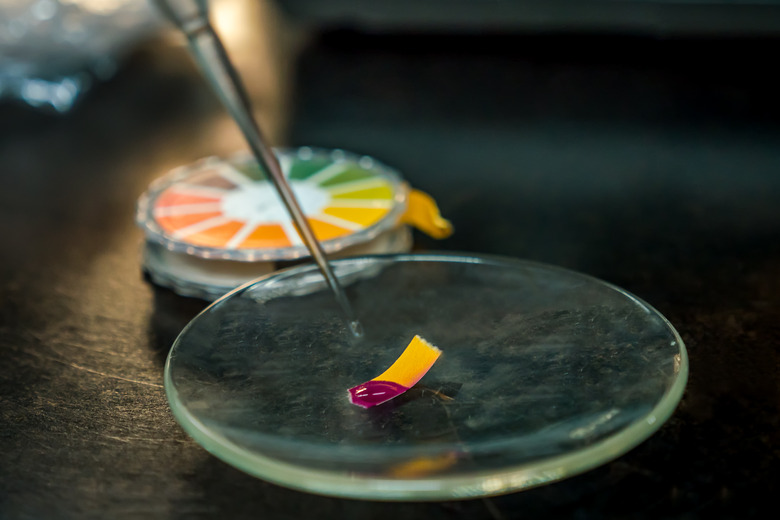What Happens In A Lewis Acid Base Reaction?
In a Lewis acid-base reaction, the acid accepts electrons, whereas the base donates electrons. This view of acids and bases allows chemists to understand better the behavior of substances that don't fit into the classic view of acids and bases. Traditionally, acids are materials that form hydrogen ions (H+) in a water solution, while bases form hydroxide ions (OH). A more generalized view is that acids donate protons, the H+ ion, while bases accept protons. The Lewis definition is broader than this explanation in that it deals with cases in which there is no hydrogen ion. Such a model is important in biological reactions such as those involving iron and hemoglobin, where no proton is transferred. These reactions can be described using the Lewis acid-base reaction definitions.
TL;DR (Too Long; Didn't Read)
A Lewis acid-base reaction involves a transfer of electrons from the base to the acid, resulting in a new covalent bond. The Lewis way of looking at acids and bases as electron acceptors and donors is broader than the traditional hydrogen ion or proton-based method and is useful in describing reactions in which there is no proton transfer.
The Lewis Description of Traditional Acid-Base Reactions
The Lewis Description of Traditional Acid-Base Reactions
For reactions involving common acids and bases, the Lewis view of the reaction differs from the traditional Arrhenius and Bronsted-Lowry descriptions, but the results are identical. For example, when hydrochloric acid (HCl) reacts with the base sodium hydroxide (NaOH), both dissociate in water to form H+, Cl-, Na+ and OH- ions. The H+ and OH- ions of acids and bases always combine to form H2O, and in this case, the sodium and chlorine ions form sodium chloride or common table salt, which stays in solution.
Another way of looking at acid-base reactions is that the acid always provides a proton, the hydrogen ion, while the base always accepts a proton via the hydroxide ion, the two combining to form water. Therefore, an acid is any substance that is a proton donor, and a base is any substance that accepts a proton.
The Lewis view of the reaction focuses on the electrons. When HCl dissociates into ions, the hydrogen ion loses an electron to the chlorine ion. When NaOH dissociates, the hydroxide ion gains an electron from the sodium ion. The hydroxide ion is made up of an oxygen atom with six electrons in its outer electron shell and a hydrogen atom with one electron. It has the extra hydroxide ion electron for a total of eight electrons available for chemical bonding. Two of them are shared with the hydrogen atom in a covalent bond while the other six are unbonded pairs. In the Lewis view, the hydroxide ion donates an electron pair to the hydrogen ion to form a second covalent bond, producing a water molecule. For Lewis acid-base reactions, an acid is any substance that accepts electrons while a base donates electrons.
Non-Proton Lewis Acid-Base Reactions
Non-Proton Lewis Acid-Base Reactions
The Lewis electron-based definition of acids and bases is broad and allows the description of reactions in which no proton is present. For example, boron trifluoride (BF3) and ammonia (NH3), react to form ammonia-boron trifluoride, [B(NH3)F3]. Boron trifluoride is a Lewis acid that accepts an electron pair from ammonia, a Lewis base. Ammonia has a nonbonded electron pair that it donates and that the boron atom accepts to form a covalent bond.
Other Lewis acid-base reactions involve the metal ions of iron, magnesium and zinc, which are important in many biological chemical reactions. Such reactions do not involve proton transfer but can be described as acid-base reactions using the Lewis definitions.
Cite This Article
MLA
Markgraf, Bert. "What Happens In A Lewis Acid Base Reaction?" sciencing.com, https://www.sciencing.com/what-happens-in-a-lewis-acid-base-reaction-13710548/. 19 March 2018.
APA
Markgraf, Bert. (2018, March 19). What Happens In A Lewis Acid Base Reaction?. sciencing.com. Retrieved from https://www.sciencing.com/what-happens-in-a-lewis-acid-base-reaction-13710548/
Chicago
Markgraf, Bert. What Happens In A Lewis Acid Base Reaction? last modified March 24, 2022. https://www.sciencing.com/what-happens-in-a-lewis-acid-base-reaction-13710548/
